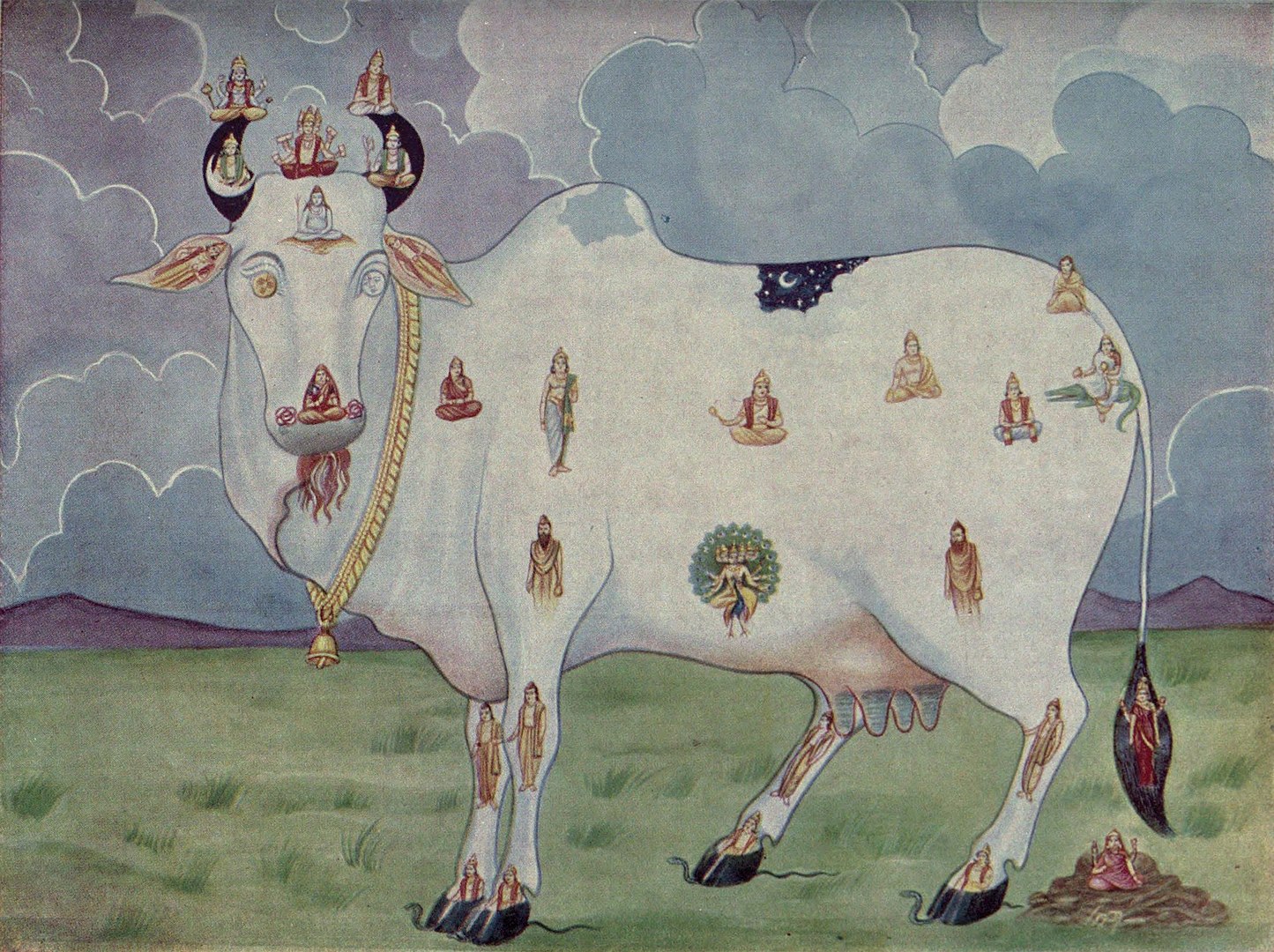
The thoughts, actions and emotions we process every day become subconscious programs. That is to say, habitual programs. Psychologists understand that between 90-95% of the decisions taken by the average person on a daily basis are determined by subconscious programs.
Not only that, but subconscious programs determine your beliefs, attitudes and perceptions. More precisely, subconscious programs determine your personality and character.
More importantly, they determine your experiences in life.
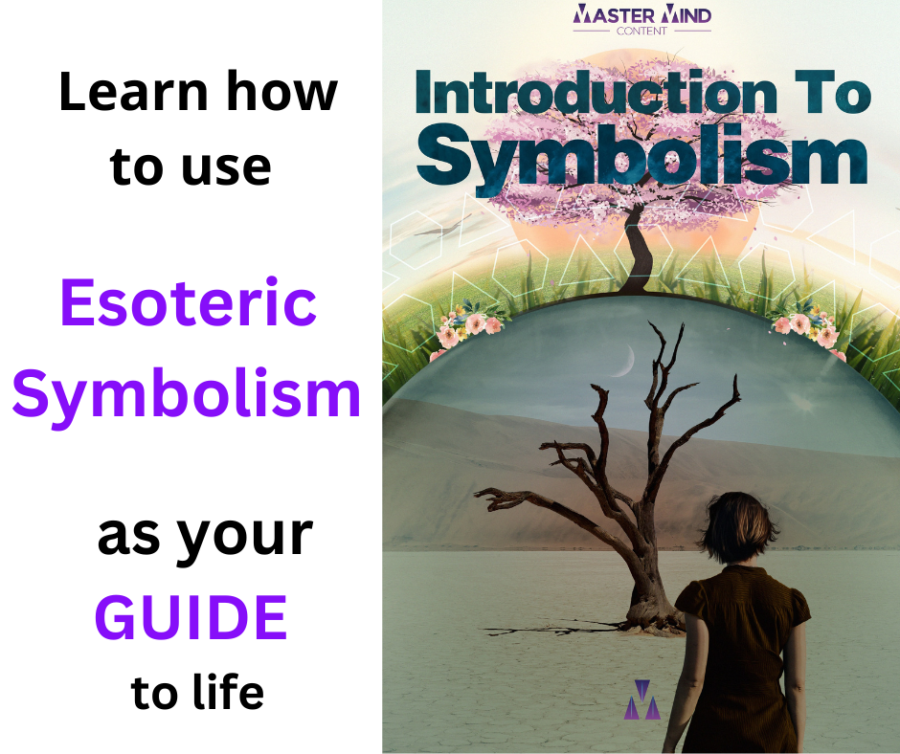
Click here to download your FREE copy of the Introduction to Symbolism Guide
The way in which the symbolic meaning of cows is used in ancient mythology gives us a clue as to their esoteric meaning. It is in the hidden meaning that you find the true value of symbols.
Through exoteric channels, we learn the symbolic meaning of cows relates to fertility, motherhood, sacrifice, nourishment, generosity and life-giving qualities. There are also numerous myths from around the world that credit a cow with the origins of life.
Nowhere in the world are cows more venerated than in India. Bovines are so revered it is unlawful to harm them. Slaughtering a cow in India is punished with a minimum of 10 years in prison. The maximum is a life sentence.
In Hindu traditions, cows are sacred to three of the most important gods; Shiva, Krishna and Indra. The animal is also associated with goddesses because of its life-giving attributes symbolised by milk.
Cow symbolism in Hinduism has a close connection with milk. A Hindu creation story, The Churning of the Milky Ocean, is basically about the struggle between the gods and demons; unconscious and subconscious content. From the churning of the ‘cosmic ocean’, the cow, Kamadhenu emerges.
Kamadhenu is the mother of all cows and is pictured in Hindu iconography with all the principal gods housed in specific areas of her body (as seen in the Header Image). Mother Kamadhenu is considered to be the seed in all cows, the “one who fulfils devotees’ wishes.
A sculpture in the Badu Caves in Kuala Lumpur depicts the mother goddess with the body of a cow, the wings of a tropical bird (possibly a phoenix) and the tail of a peacock. The details point to Kamadhenu as a symbol of transformation.
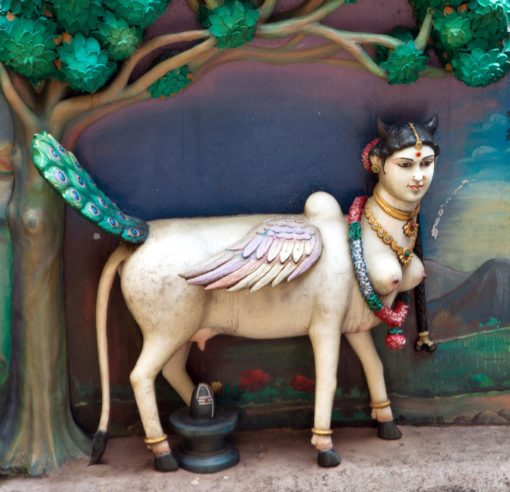
Herein, we find a clue to the deeper symbolic meaning of cows. Whilst official channels merely tell us cows are sacrificial animals that represent fertility and healing, bovines also provide us with the sustenance (knowledge/power) we need to create the things we want in life (fertility).
There are more clues in the symbolism of Hindu myth. The ocean of milk the gods and demons are churning represents the conscious mind. The cow which emerges relates to the importance of changing your habitual patterns of behaviour (sacrifice) in order to expand conscious awareness and achieve your personal goals.
Milk is regarded as ambrosia in Greek mythology. Both Demeter and Hera, goddesses closely associated with the cow, both feature in Greek mythology feeding babies ambrosia. Other Greek gods associated with cows are the sun gods Helios and Apollo, both of whom are cowherds.
One of the most famous stories in Greek mythology is the story of Io, the first priestess of the goddess Hera. When Zeus fell in love with Io, he tried to hide his indiscretion by transforming his illicit lover into a cow.
Hera, however, was too wise to Zeus’ tricks and ordered the “all-seeing” Argus to watch over the heifer. Frustrated, Zeus sends Hermes to help. The enigmatic god played such a soothing melody on his lyre that all one-thousand eyes of Argus fall to sleep.
But Hera was not to be fooled. Instead, she sent a gadfly to bother the cow. In her attempt to escape, Io wandered the earth before arriving in Egypt where she gave birth to a son. Io is identified with the Mother goddess Isis.
During periods of transformation, you will face challenging situations. These are the tests you must go through until you reach your moment of self-realisation. There are two ways to achieve this; through Demeter or through Hera.
Hera is associated with the hero archetype, the aspect of your character that has to overcome personal challenges in order to transform and grow. The name of the hero Herakles, for example, literally means “Glory of Hera.” During his 12 labours, Hera meddles with his tasks to make life harder for him.
When Herakles was a baby, Zeus secretly tried to feed him Hera’s breast milk, but the goddess woke and, in a fit of jealousy and anger knocked the child away. She would later send the hero into a mad frenzy and kill his wife and children. The ancient Greeks had some gruesome methods to help teach people about the necessity to make sacrifices.
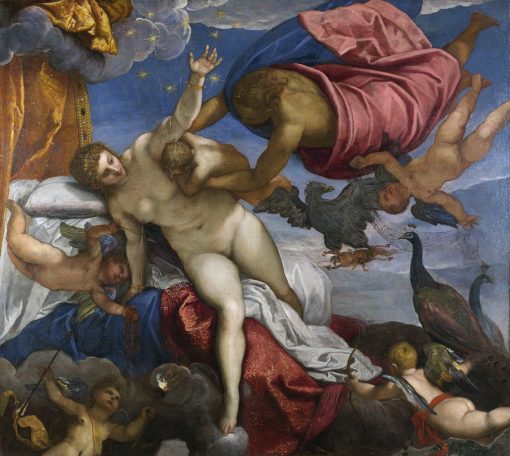
Hera’s method for reaching self-awareness and re-programming the subconscious is the hard way; through challenges, humiliation, frustration and a search for meaning. During these moments, you need to adopt the attributes of a cow; patience, nurturing and sacrifice.
The most difficult experiences are often the most rewarding once the victory is won. This is reflected by Io giving birth to a son. Children represent the experiences you manifest in life and sons are a symbol of inner strength.
Her primary symbol is wheat and corn which essentially share the same attributes as the cow in that food is nourishment. The only difference is that with agriculture, seeds are planted and need to be nourished and nurtured with water and manure (cow dung).
This is arguably a clearer analogy for how the subconscious mind is programmed.
The conscious mind plants the seeds of creation in the subconscious by thoughts and actions. The information you plant in your subconscious ultimately becomes the auto-pilot for future thoughts, actions and emotions.
“The subjective mind is always amenable to suggestion; it is controlled by suggestion. We must recognise that the subconscious mind accepts all suggestions; it does not argue with you, but it fulfils your wishes. All things that have happened to you are based on thoughts impressed on the subconscious mind through belief. The subconscious mind will accept your beliefs and your convictions.” ~ Joseph Murphy – The Miracles of Your Mind
Earth is a symbol used for the subconscious mind. The conscious mind is the seed that plants information (corn and wheat) in the subconscious mind and the nurturing qualities of Demeter, and thus the cow, help you maintain new ways of living until your subconscious program is upgraded.
The subconscious stores the programs that prompt the thoughts, emotions and actions which ultimately manifest as your existence of reality. This is why milk is called ‘ambrosia’ – considered to be the drink of the gods.
Cows were also connected with motherhood and fertility in Egyptian myth. Bovines were most noticeably associated with Mother goddesses, Mehet-Weret, a heroine of a creation myth.
As we find in Hindu mythology, Mehet-Weret is a cosmic cow that is a goddess of the primordial waters and is associated with death and rebirth. She is said to have given birth to the sun at the beginning of time.
The sun is a symbol of self-knowledge; enlightenment, illumination. Mehet-Weret is synonymous with other Egyptian goddesses Neith, Hathor and Isis, all of which have close connections with sun gods.
The Egyptian goddess Nut, the mother of the sun god Osiris, is also depicted as a cosmic cow with four stars on her belly. The stars are said to represent the “four cosmos quadrants of the earth” which are also known as the four elements – each of which has a symbolic meaning.
The creation story of Norse mythology also starts with a cosmic cow – Audhumla. The cow emits “four rivers of power” from her udders which nourish Ymir, the primordial giant which would later be dismembered and form the earth.
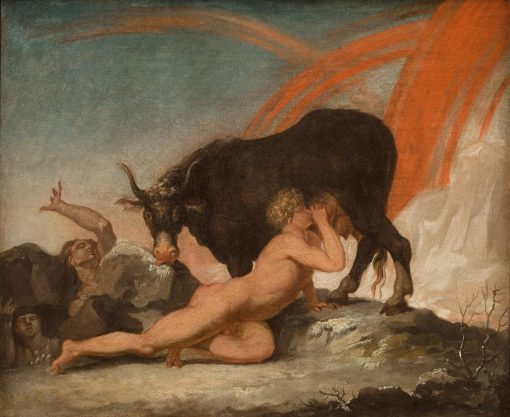
Here again, we see the symbolic meaning of the cow representing nourishment, nurturing and motherhood. Isn’t it uncanny how all these mythologies from different cultures have the same meaning?
And to reiterate this fact, the earth which Ymir becomes is also a symbolic representation of the subconscious. Dismemberment in myth relates to dissociated consciousness which happens where the brain shields information absorbed by the five senses from the conscious mind and buries the hidden information in the unconscious.
At some point, the hidden knowledge wants to get out.
The symbolic meaning of the cow relates to staying connected yourself, nurturing your plans by nourishing your psychological development. To get to where you want in life, you have to become the person you need to be.
And that often means making sacrifices in order to upgrade the subconscious programs that block your path.
It is common to be confronted with obstacles along the path of life. You will face many challenges, but every experience is an opportunity to learn something about yourself. This learning process requires the knowledge which we get from the milk of the cow – the ambrosia of the gods, the power of the unconscious mind.
When you change habitual thoughts and behaviours you expand conscious awareness and your perception becomes more acute. When you put knowledge into action, you become wise – a trait symbolised by sun gods – the cowherds.

Click here to download your FREE copy of the Introduction to Symbolism Guide
